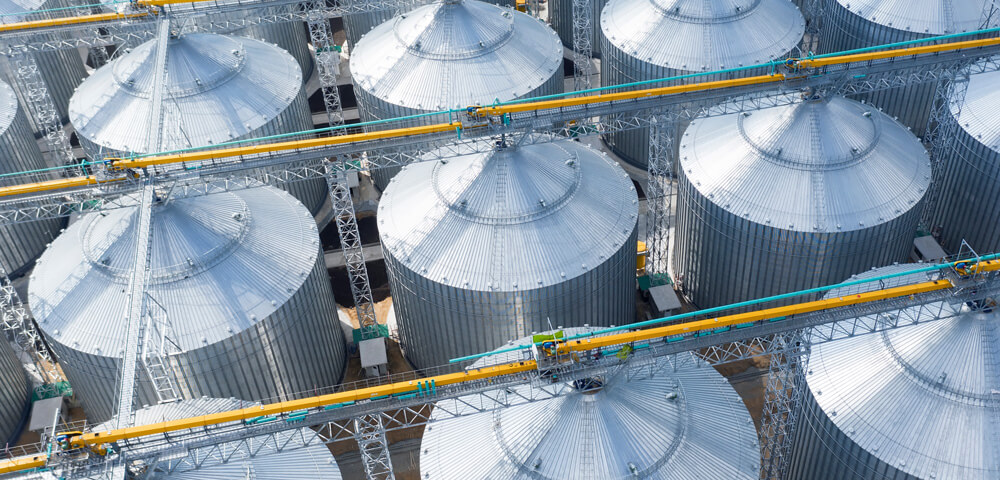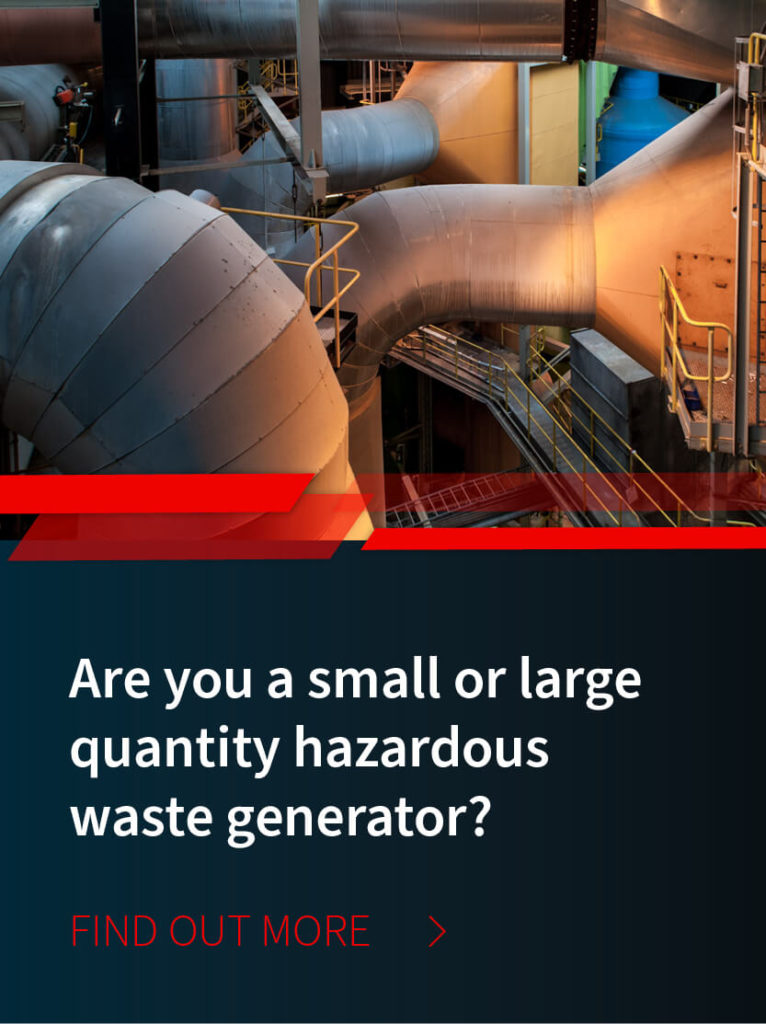
/ IN THIS BLOG
RCRA metals disposal probably isn’t top on most people’s list of facility management priorities. After all, when people think of hazardous waste, they often imagine dramatic spills or brightly labeled barrels of chemicals. But in reality, hazardous waste doesn’t always carry a label or look dangerous. Some of the most regulated materials are found in common industrial, laboratory, and commercial operations. One key category to be aware of is RCRA metals.
These eight metals are federally regulated under the Resource Conservation and Recovery Act due to their potential to harm people and the environment, particularly at certain concentration levels. In Atlanta and across Georgia, facilities that generate, disturb, or manage materials containing these metals must follow specific federal and state hazardous waste disposal rules.
Whether you operate a manufacturing site, a laboratory, or a commercial facility, understanding how to properly identify and dispose of RCRA metals is essential to maintaining compliance and avoiding costly liability. What qualifies as a RCRA metal? And how does metal testing work? Get answers to your questions and learn what your responsibilities are under hazardous waste disposal regulations in Atlanta and beyond.
01 / What Is RCRA and Why Does It Matter?
The acronym RCRA gets mentioned a lot when it comes to waste disposal, so it’s helpful to understand what exactly RCRA is. RCRA stands for the Resource Conservation and Recovery Act, which was enacted in 1976 and overseen by the Environmental Protection Agency This is the federal law that governs hazardous waste, including its:
Generation
Transportation
Treatment
Storage
Disposal
As you can see, the RCRA gives the federal government authority over the entire lifespan of hazardous waste. That’s an essential concept of waste management known as cradle-to-grave responsibility.
Under RCRA, any facility that generates hazardous waste is legally responsible for that waste throughout its entire lifecycle. This is something that many people unfamiliar with the nuances of waste management may overlook, but it has significant implications. It means you are accountable not only for how waste is handled on your site, but also for how it is transported, treated, and ultimately disposed of. This is true even if a third-party vendor is involved. With the RCRA, there is no passing the responsibility on to someone else. Which is why it’s critical to partner with a waste management company you can trust.
When it comes to heavy metals, RCRA includes specific regulatory thresholds. If the concentration of certain metals in your waste exceeds those limits, the waste must be managed under hazardous waste regulations. Failing to identify and manage these materials properly can lead to enforcement actions, fines, and environmental liability.
Understanding RCRA is the foundation for safely and legally handling metal-containing waste streams at any Atlanta facility. Remember that RCRA is the federal minimum for enforcement. Additional state and local rules must also be followed if they exceed those of the RCRA’s scope.
02 / Understanding RCRA Metals
The RCRA identifies eight heavy metals that are regulated as hazardous when present in concentrations above federally defined limits. These metals are known as the “RCRA 8”. While some occur naturally, their industrial uses and potential toxicity make them a priority for regulation and disposal oversight.
Here’s a breakdown of the eight metals and where they are commonly found in commercial settings:
Arsenic: Found in pesticides, wood preservatives, and treated lumber. It’s toxic at high levels and can contaminate soil and groundwater, especially near former agricultural or industrial sites.
Barium: Common in oil and gas drilling fluids, electronics, and medical imaging agents. When improperly handled, barium compounds can pose health risks and remain in the ground water and soil once contamination occurs.
Cadmium: Present in battery production, metal plating, and pigments. Cadmium accumulates in soil and living organisms, making it a major concern near manufacturing facilities.
Chromium: Used in electroplating, stainless steel production, and dyes. Chromium VI, in particular, is a known carcinogen and strict limits apply to its disposal due to its mobility in water.
Lead: Found in ammunition, batteries, old paint, and legacy plumbing or construction materials. Lead contamination is one of the most common reasons for hazardous soil classification during property redevelopment.
Mercury: Historically used in thermometers, switches, fluorescent bulbs, and lab equipment. Mercury vapor and waste must be carefully managed to avoid serious exposure risks.
Selenium: Appears in electronics, solar panels, glass manufacturing, and animal feed additives. Excess selenium in water can be toxic to aquatic life and difficult to remove once released.
Silver: Found in photo processing waste, electronics, and certain medical or dental byproducts. Silver can be toxic to fish and other organisms even at low concentrations.
Each of these metals is only considered hazardous when it exceeds a certain concentration in waste materials. That’s where formal testing becomes critical.
03 / How RCRA Metals Are Measured and The Role of TCLP Testing
Identifying the presence of RCRA metals is only part of the equation. What determines whether a material is classified as hazardous waste is the concentration of those metals. This is where TCLP testing comes in and becomes an important component in making sure you’re fully compliant.
TCLP stands for Toxicity Characteristic Leaching Procedure. It’s a laboratory method used to simulate how contaminants might leach from waste into groundwater over time. The test results determine whether a waste sample exceeds federal regulatory thresholds set by the EPA for each RCRA metal.
For example, the limit for lead is five milligrams per liter. If the TCLP test detects a concentration above that level, the waste must be managed as hazardous. The same rule applies for the other seven RCRA metals, each with its own threshold. Below is a complete list of current thresholds, but these should also be checked against the RCRA code 40 CFR § 261.24:
| RCRA Metal | TCLP Regulatory Limit (mg/L) |
| Arsenic | 5.0 |
| Barium | 100.0 |
| Cadmium | 1.0 |
| Chromium | 5.0 |
| Lead | 5.0 |
| Mercury | 0.2 |
| Selenium | 1.0 |
| Silver | 5.0 |
Without a TCLP test, there’s no reliable way to know if waste qualifies as hazardous. Don’t make the mistake others have and assume based on a visual inspection or gut-feeling based on the material’s origin. These are not sufficient methods. Any Atlanta facility dealing with contaminated soil, residual dust, process waste, or demolition debris should consult with a licensed hazardous waste company to perform proper TCLP testing.
Real-World Scenarios: How Metals Show Up in Atlanta Sites
RCRA metals aren’t limited to large industrial operations. In and around Atlanta, these contaminants can appear in a wide range of commercial, lab, and property settings. In many cases, the facility manager or property owner may not even be aware of the risk until testing reveals it.
Here are a few common examples of places where the RCRA 8 metals might appear:
Former firing ranges or training facilities: Lead from spent ammunition can accumulate in soil over time. Any redevelopment or construction project on a former range site should begin with a hazardous waste assessment.
Laboratories and research facilities: Metals like mercury, cadmium, and selenium may be present in small quantities across multiple lab processes. When equipment or chemicals are discarded, waste must be tested and characterized.
Manufacturing operations: Plating, electronics production, and pigment manufacturing often involve RCRA metals like chromium, silver, and cadmium. Spent solutions, filters, rags, or floor sweepings may all qualify as hazardous.
Old buildings or renovation projects: Legacy materials such as lead-based paint, mercury-containing devices, or building materials with arsenic-based preservatives can lead to contamination during demolition or cleanup.
Identifying whether these sites require hazardous waste handling depends on testing and proper classification. Atlanta facilities should work with experienced environmental providers to confirm what’s present and how it must be managed under RCRA.
04 / How RCRA Hazardous Waste Must Be Disposed in Atlanta
If a TCLP test confirms your waste exceeds the limits for any of the eight RCRA metals, it must be managed as RCRA hazardous waste. That triggers specific disposal rules under the Resource Conservation and Recovery Act and Georgia’s environmental regulations.
Here’s what happens next:
Assign the correct EPA hazardous waste code: Each metal corresponds to a D-list waste code, such as D008 for lead or D009 for mercury. These codes are required on the waste manifest and documentation.
Prepare a waste profile: Before waste can be accepted by a disposal facility, your company must submit a waste profile that outlines the type, quantity, and characteristics of the hazardous material.
Select a permitted treatment, storage, and disposal facility (TSDF): Waste containing RCRA metals must go to a Subtitle C landfill or TSDF authorized to accept and treat this waste. Some waste may be eligible for treatment, stabilization, or incineration before final disposal.
Use a registered hazardous waste transporter: In Georgia, only licensed transporters may move RCRA waste. The transporter must carry a valid EPA ID and follow strict rules for packaging, labeling, and manifesting.
Maintain records and reports: RCRA requires detailed recordkeeping of hazardous waste activities. Large quantity generators in Georgia must also submit biennial reports summarizing waste generation and disposal.
Working with an experienced waste management provider ensures every step is handled correctly—from testing to transport to final disposal.
Common Mistakes with RCRA Metals Disposal
Even well-meaning teams make errors that lead to fines or safety hazards. Here are a few to avoid:
Skipping the TCLP test: Guessing contamination levels without lab confirmation can result in improper disposal.
Mislabeling or missing hazardous waste codes: Incorrect or incomplete manifests are a red flag for regulators.
Using a general waste hauler: Only licensed hazardous waste transporters can legally handle RCRA waste
Mixing hazardous and non-hazardous waste: Co-mingling wastes can escalate costs and regulatory consequences.
Failing to keep disposal records: Missing documentation creates audit risks and potential liability.
05 / Partner with a Trusted Atlanta Hazardous Waste Expert in Georgia
RCRA metals disposal mistakes can be costly from both a financial perspective and an environmental one. An infraction can open your business up to lawsuits and permanent reputational damage. The stakes are simply too high to manage it yourself.
Whether you're managing a lab, overseeing compliance, or running a manufacturing facility in Atlanta, you want to be sure you navigate federal and state hazardous waste disposal rules properly. This requires the experience and precision of a reliable waste disposal partner.
MCF Environmental Services is a full-service hazardous waste management partner based in Georgia. From TCLP testing to final disposal, we ensure every step is compliant, efficient, and tailored to your facility's needs. We help countless Georgia businesses maintain compliance and peace of mind, across the lifespan of your waste materials. You can trust our team to maintain safety and compliance every step of the way.
Want to learn more about our hazardous waste services? Reach out to schedule a consultation or get a quote for RCRA hazardous waste services in Atlanta.
Robert Losurdo
President, COO








